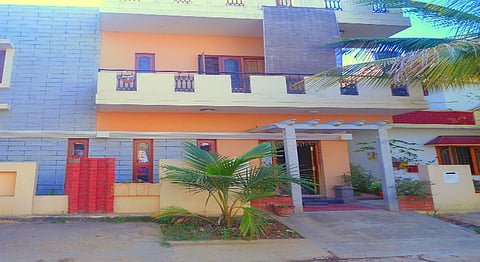
- HOMEGROWN WORLD
- #HGCREATORS
- #HGEXPLORE
- #HGVOICES
- #HGSHOP
- CAREERS
- ABOUT US
- CONTACT US

Tired of all the endless power cuts and exorbitant electricity bills that you receive every month? Maybe it is time you take a leaf out of Vinay Janardhchari’s book and make your house completely sustainable. The Janardhchari household in Madivala, Banglore is solar powered and equipped with a bio-gas plant, a rain water harvesting system and a waste segregation system, reported The Alternative. Making the house sustainable was integrated into the way it was built, at the time of construction solar panels were installed at the top of the house and DC conduits were used to plug in appliances like lights and fans.
The house also includes a bio-gas plant in the house converts all the organic waste into gas. The five kg plant is sufficient for the family of five. The bio-gas plant set them back by a total of Rs. 27,000 but the benefits have been much higher and is only rising since. The waste left over from the bio-gas plant is composted and used as manure in the family’s garden.
People generally have a misconception that creating an environmentally-sound house rakes up exorbitant expenses, but Vinay says that the initial investment was approximately Rs.75,000 when he was installing the setup in 2012. He says that since then, technology has thankfully become more available and hence, less expensive which should encourage homeowners to go the green way. And what’s even better is that there is little to no maintenance involved in most of the installations. Compared to conventional houses, there no large water and electricity bills to pay.
To people who are interested in having such structures installed in their homes, Vinay advises, “Invest a little time as well to learn about the different components in them so that in case the need arises, you can always fix it yourself instead of calling a technician.” Even if you aren’t up for a complete renovation, Vinay has some handy tips to live a life that is better for the planet and your pocket. He recommends managing water and energy efficiently and says that installing a simple rainwater harvesting can save users a lot of money. Moreover, it is always better to Make a provision for a separate plumbing arrangement for using treated water in the toilet flushes so that 75% of the water can be re-used.
It is true that government intervention can make large-scale changes to make homes more friendly. Vinay agrees, “In a 1200 sq.ft a 1 kw solar installation should be made mandatory by the government as part of construction regulations. And for a house with a higher square footage, capacities should be mandated accordingly instead of depending solely on the power suppliers for electricity.” He also says that making rainwater harvesting compulsory can prevent a humongous wastage of water that would otherwise become runoff.
Examples like the Janardhchari household are important to ward off misconceptions that being environment friendly is difficult, time consuming and expensive. They have effectively proved that an investment in making your house more sustainable can lead to greater benefits while also allowing you to enjoy that peace of mind from helping the Earth.
Feature Image Courtesy: Vinay Janardhchari
